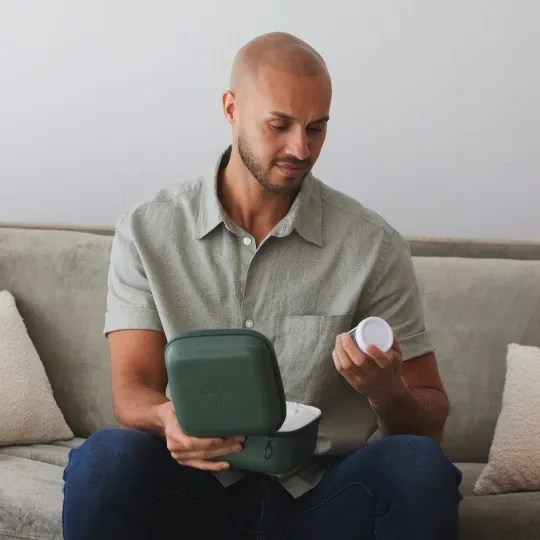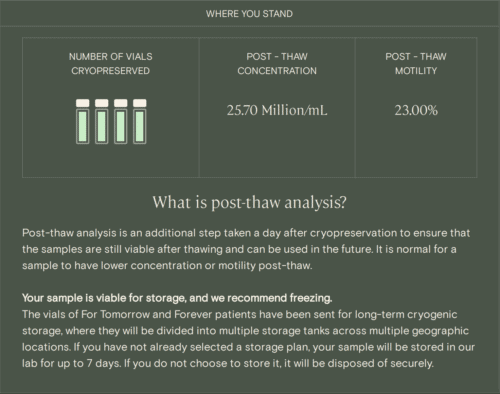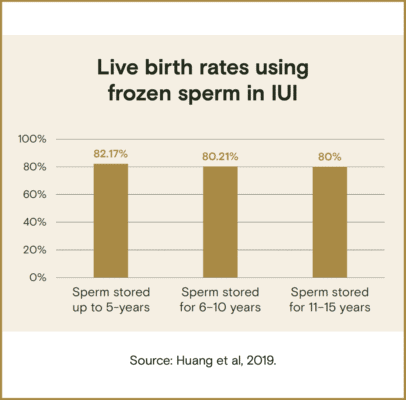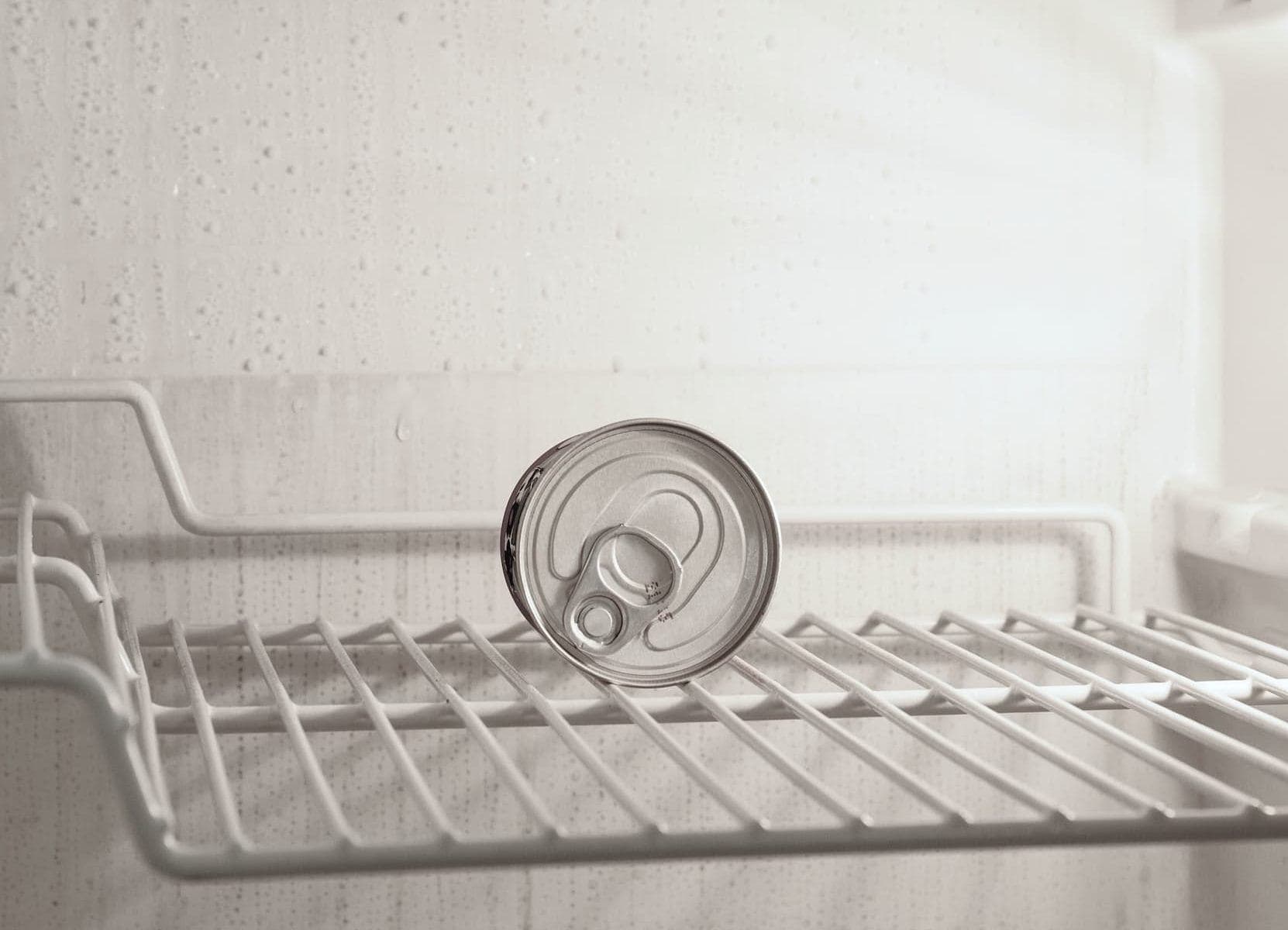Sperm freezing offers many benefits, including the flexibility to start a family later in life and being prepared with a back-up plan. Cryopreservation of sperm is growing in popularity for these reasons and more. Many who have just been introduced to the idea will wonder: can you freeze sperm at home? Does it require a specialized lab, or will your home freezer work?
While freezing sperm at home seems simple enough, you definitely don’t want to take chances with the DIY route. Read on to learn why freezing sperm at home in your freezer isn’t possible, and to learn about an affordable alternative method.
Takeaways:
- You can’t freeze your sperm in a household freezer, as the process requires a special lab and liquid nitrogen storage tanks.
- Mail-in sperm freezing kits offer the option to cryopreserve your sperm without visiting a fertility clinic or sperm bank.
- At-home sperm freezing offers more privacy, comfort, and convenience, plus more affordable storage fees.

Can I freeze my sperm in a household freezer?
Although sperm freezing seems as simple as producing a sample and sticking it in a freezer, there’s more to it than that. Let’s review the process of sperm freezing to understand why sperm freezing in a household freezer isn’t an option.
The process of sperm freezing
When someone chooses to freeze their sperm, they will produce a semen sample via masturbation. The first step in the process is a semen analysis. This ensures that you are freezing healthy, viable sperm, instead of a sample that doesn’t have a strong chance of surviving or creating a pregnancy. During a semen analysis, a lab scientist will examine your sperm sample to see if your sperm count/concentration (how many sperm), motility (how sperm are moving), or morphology (how sperm are shaped) are abnormal.
Learn more about sperm testing.
Another important step in the sperm freezing process is a post-thaw analysis. During a post-thaw analysis, a small portion of your sample is frozen and then thawed — to replicate the conditions your sperm will experience in the future — and then analyzed to determine how many sperm survived. The post-thaw analysis is the best indicator for how many sperm will be viable and motile when you are ready to use your frozen sample.

Before being frozen, sperm should be “washed,” a term for preparing it by removing the plasma of the semen and any contaminants. This process requires specific laboratory solutions and a centrifuge, a machine that quickly spins samples to separate the sperm from the rest of the seminal fluid.
Sperm must be preserved in liquid nitrogen at -196ºC in order to be viable in the future. Then, they must be kept stored at -196ºC — the temperature at which all biological activity pauses — constantly in order to maintain their viability. At higher temperatures without transport media, sperm will die in a matter of hours to days.
This is achieved at a cryostorage facility with the use of large liquid nitrogen tanks. The average household freezer isn’t able to produce anywhere near as low as the required temperature for sperm storage.
Once you understand the process of sperm cryopreservation and storage, it’s safe to say you’ll understand why sperm freezing is not something that can be accomplished with a freezer at home.
The right way to freeze sperm at home
Although you can’t use your household freezer to freeze your sperm, visiting a fertility clinic or sperm bank isn’t your only option for cryopreservation. Freezing sperm at home with a Legacy at-home sperm freezing kit allows for privacy, discretion, and significant savings.
With a Legacy kit, you can produce a sample from the comfort of your own home and overnight that sample to a lab. There, we’ll analyze, process, and store your sperm for as long as you need.

What does the at-home sperm freezing process look like with Legacy?
If you don’t want to visit a fertility clinic or are seeking a more affordable option for sperm cryopreservation, then an at-home sperm freezing kit is a great option. You can receive a full sperm analysis, personalized recommendations, telehealth services with a fertility specialist, and secure storage — all without ever leaving your home.
It’s recommended that before you freeze your sperm, you have blood work done to screen for infectious diseases, including STIs. This is so your sample can be used in a lab that requires this screening, if necessary.
The first step to freezing sperm with Legacy is to order an at-home sperm freezing kit. You’ll be mailed a kit that comes with a secure storage vessel to protect your sample during shipment, and a transport media to keep your sample viable during overnight shipping.
Legacy’s kits allow you to produce a semen sample in the comfort of your own home. This is more private and less uncomfortable for many than the traditional process: making an appointment, sitting in a waiting room, and then producing a sample sample in a stark, clinical collection room.
When you order an at-home sperm freezing kit with Legacy, it comes with a clinic-grade sperm analysis and personalized recommendations to improve your fertility. You can choose plans that include telehealth services, sperm DNA fragmentation analysis, and more.
Sperm samples frozen with Legacy are kept in “multi-site storage,” meaning that they are sent to multiple locations to mitigate any risk (however small). The cost of yearly multi-site cryogenic storage with Legacy is as low as $20 per sample — a fraction of the cost you’d expect with a fertility clinic or sperm bank, which can be upwards of $500 per year.
See your sperm testing and freezing options.
Sperm freezing success rates
A recent study shows that frozen sperm works just as well as fresh sperm for in vitro fertilization (IVF) procedures.
When a frozen semen sample is thawed, around 50–75% of the sperm survives. If the semen sample was high quality and healthy, this should still give you a good chance of achieving pregnancy with an insemination. Healthy semen samples have sperm counts ranging from 15 million to 200 million or more sperm per milliliter of semen, with 40% motility or higher. Semen samples with over 8 million total motile sperm count perform most effectively in IUI.
The number of sperm samples you should freeze depends on both your sperm health and your family planning goals. For example, if you are planning for intracytoplasmic sperm injection (ICSI), a single ejaculate sample — or about 4 vials of frozen sperm — may suffice. But with IUI, where success rates are lower, 3–5 vials of sperm is recommended per pregnancy you hope to have. If you’re unsure about the amount of sperm you should freeze, it’s best to speak with a fertility specialist.

Who should consider sperm freezing and why?
There are people who may consider freezing their sperm. This includes:
- People who want to have children later in life, after the age of 35. Learn more about age and male fertility.
- Cancer patients, before undergoing treatment. Learn more about chemotherapy and male fertility.
- Trans women, before undergoing medical gender confirmation surgery. Learn more about fertility preservation for trans women.
- People who work in high-risk occupations or environments, such as welding, plastic production, or radiology.
- Military personnel, especially before deployment. Learn more about sperm freezing for the military.
- Those considering a vasectomy who still want options.
- Anyone who wants peace of mind about their fertility.
While this list isn’t comprehensive, it highlights some of the primary reasons why someone would want to freeze their sperm. Sperm freezing provides you with more options, flexibility, and control over your fertility.
Historically, cryopreservation of sperm has not always been attainable for all due to availability of fertility clinics in certain geographic locations and the high costs. Thankfully, at-home kits have made sperm freezing convenient and affordable. If you are interested in sperm freezing, you can ensure your legacy today by ordering the right at-home sperm freezing kit for you.




